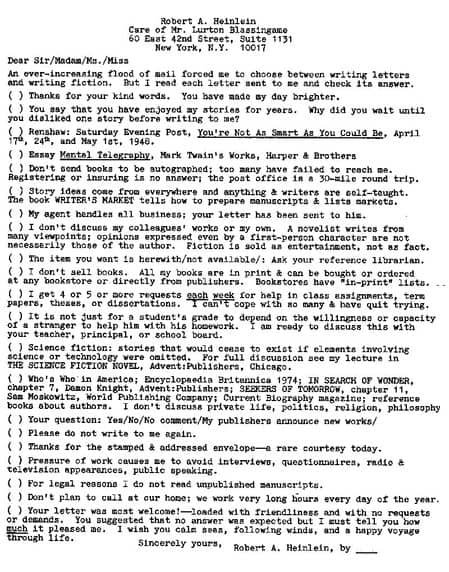
A reader recently pointed me toward a fascinating post on Kevin Kelly’s CT2 blog. It concerned the fan mail received by the famed science fiction author Robert Heinlein. Unable to keep up with the deluge of incoming correspondence, Heinlein devised a form letter (pictured above), which included responses to twenty-one common questions and requests.
These canned replies include, for example, a pointer to the book Writer’s Market for more information on how to prepare manuscripts for submission, and an apologetic note explaining that Heinlein is unable to participate in class assignments. (I empathize with this last one. I’m honored by the surprisingly large number of classes that assign my books or articles, but to my regret, I rarely have enough time to participate in evaluating this work.) To answer fan mail, Heinlein would simply check the box on the form letter next to the most appropriate response.
If we fast forward a few decades later, we find a further refinement on this idea from Neal Stephenson, a literary descendent of Heinlein, who stopped these messages before they arrived by posting an essay on the “contact” page of his website that explains why you shouldn’t bother trying to bother him. It’s called “Why I’m a Bad Correspondent,” and it includes one of my all-time favorite passages about communication:
“If I organize my life in such a way that I get lots of long, consecutive, uninterrupted time-chunks, I can write novels. But as those chunks get separated and fragmented, my productivity as a novelist drops spectacularly. What replaces it? Instead of a novel that will be around for a long time, and that will, with luck, be read by many people, there is a bunch of e-mail messages that I have sent out to individual persons, and a few speeches given at various conferences.”
The rules by which we communicate have a big impact on our ability to do useful work. Too often we just accept whatever seems standard or easy in the moment. It’s nice to remind ourselves that not everyone accepts this fate.

Cal – yep, I always loved Stephenson’s note (although he gave up a bit on social media). I also love Donald Knuth’s note on why it’s virtually impossible to contact him!
I remember being suitably impressed and intimidated by Donald Knuth’s books in the library during my Computer Science degree! Those books are a true testament to his approach and to Deep Work.
This is terrific! I am a baking cookbook author and get many questions about baking, recipes, or about the business of cookbook writing. I really want to help folks, but I find that it’s usually the same few questions over and over (with differences related to specific recipes, etc). I haven’t found a good way to deal with this–but I realize that I think it might help to have a document of replies that I can cut and paste to each e-mail. Thank you!
Hello Jeanne, I just had to reply to your comment! I am a professional baker and former brick & mortar bakeshop owner interested in writing unique cookbooks based on my experiences and recipes. It’s one of many reasons I love Cal’s work. This was such a wonderful surprise to see someone from my industry’s ‘neck of the woods’. Blessings to you!
Kristi
It is also worth reading the Social Media section on Neil Stephenson’s web page:
“Though I never became a heavy poster on social media, I did reach a point last year when I was checking Twitter and my personal Facebook every few minutes. When I found myself manually refreshing the Facebook window in the hopes of dredging up posts I hadn’t seen yet, I decided it was time to think a little harder about the effect that this was having on my ability to get things done.”
So, despite his ability to resist email, he still fell to the trap of social media a few years later.
It is a warning sign about how effective the methods of social media services are.
Still, with self-awareness and deliberate practice, it is possible to improve the situation, as his example shows:
“Some of the posts are going to come directly from me, others from my publisher or from people I trust to post content that my social media followers will find interesting. And except in very rare cases I’m not going to read the comments.”
The Writers Market book will probably answer my question to your podcast last Monday. Good stuff!
Prof. Philip Guo has a similar email FAQ:
https://pg.ucsd.edu/#email
Potentially related, he’s taken most of his published materials including blogs and podcasts off the Internet. He’s a lot harder to reach than he used to be. He was most famous for an essay about his PhD experience.
Tim Ferriss has a lot to say about this sort of thing.
We used to use form emails and letters like that in my former job so we did not have to write the same thing over and over again. Also every time you use it, you can improve your response so they get better and better over time.
I am really amazed that people in this position do not have an auto-response email, FAQ and an assistant. Tim Ferriss has an auto-response which clearly says he is not interesting in new investments, reading new books or speaking engagements. It also says basically I get so many emails your chance of response is low so sorry in advance. His friends know to ignore this as his assistant will pass the email to him.